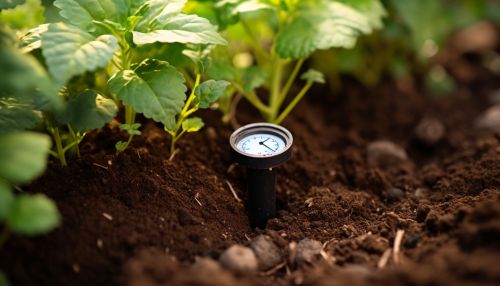Soil pH
Introduction
Soil pH is a measure of the acidity or alkalinity of soil. It is an important parameter in determining the soil's suitability for various plants and the availability of nutrients within the soil. Soil pH is measured on a scale from 0 to 14, with 7 being neutral. Soils with a pH less than 7 are acidic, and those with a pH greater than 7 are alkaline.


Importance of Soil pH
Soil pH is a crucial factor in plant growth as it affects the availability of nutrients in the soil and the activity of soil microorganisms. It influences the solubility of minerals or nutrients, thus affecting the amount of nutrients available for plant uptake. For instance, most nutrients are more soluble in acidic soils than in neutral or alkaline soils.
Determination of Soil pH
Soil pH can be determined using several methods, including the use of a pH meter, litmus paper, or a soil pH testing kit. The most accurate method is to use a pH meter, which measures the hydrogen ion activity in a soil-water suspension.
Factors Affecting Soil pH
Several factors can affect soil pH, including the parent material of the soil, the amount of rainfall, the types of plants growing in the soil, and human activities such as the application of fertilizers or lime.
Soil pH and Plant Growth
The pH of the soil can affect plant growth in several ways. It can influence the solubility of nutrients, affect the activity of soil microorganisms, and influence the toxicity of certain elements in the soil.
Soil pH and Nutrient Availability
The availability of many plant nutrients in the soil is affected by soil pH. Some nutrients, such as nitrogen, phosphorus, and potassium, are more available in slightly acidic to neutral soils. Other nutrients, such as iron, manganese, and zinc, are more available in acidic soils.
Soil pH and Soil Microorganisms
Soil pH also affects the activity of soil microorganisms, which play a crucial role in nutrient cycling and organic matter decomposition. Most soil microorganisms prefer slightly acidic to neutral pH levels.
Soil pH and Toxic Elements
In acidic soils, certain elements such as aluminum and manganese can become more soluble and reach toxic levels for plants.
Management of Soil pH
Soil pH can be managed through the application of lime to raise the pH of acidic soils or the use of sulfur to lower the pH of alkaline soils. The amount of lime or sulfur needed depends on the current soil pH and the desired pH level.
Conclusion
Soil pH is a critical factor in determining the suitability of a soil for various plants and the availability of nutrients within the soil. Proper management of soil pH can lead to improved plant growth and productivity.
